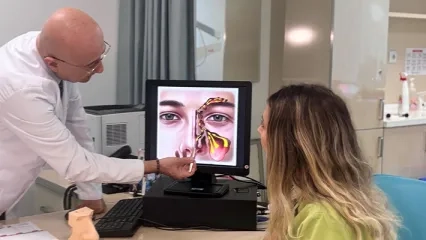Alo Yeditepe
Alo Yeditepe
Newborn Intensive Care Unit (NICU)
They are special units where premature babies and newborns are born on time but with various health problems are followed closely, and treatment and care services are carried out safely.
In our Newborn Intensive Care Unit, up-to-date technological equipment such as incubators, open beds, respiratory support devices, monitors, medication pumps, central gas and oxygen systems, and uninterrupted power supplies are used.
The newborn intensive care team consists of physicians and nurses who are specialized in neonatal intensive care. A multidisciplinary approach is followed, including physicians from other specialties, in evaluating the critical conditions of patients and arranging their treatment.
In the Newborn Intensive Care Unit, continuous treatment and care services are provided 24 hours a day, 7 days a week. Instant changes in the baby are monitored with advanced devices, and necessary interventions are made and recorded in the fastest way.
What is the Goal in Newborn Intensive Care Treatment?
It is the treatment of the underlying disease that impairs the general condition of your baby and the prevention of permanent damage that may develop during the control of the existing problem. While the current disease of the baby is being treated, the continuity of body functions is maintained by providing advanced life support when necessary. In the Newborn Intensive Care Unit, patient-centered nursing care, which requires professional knowledge and skills, is provided by trained nurses in accordance with infection control principles.
What Is Mechanical Ventilation?
Babies who do not breathe or have respiratory difficulties with mechanical ventilation are provided with respiratory support until this problem is treated. The connection between the baby and the device is made through a tube (endotracheal tube) that is delivered from the mouth to the trachea.
What Is Incubator?
They are living spaces where babies born prematurely or sick are cared for until they complete their development, and parameters such as temperature, humidity, and oxygen are kept in a controlled manner in order to protect them from diseases.
Why are Babies Kept in Incubators?
Full-term newborns and premature babies whose vital signs deviate from normal are placed in an incubator until their vital signs, nutrition, and adaptation to the external environment return to normal. The baby is cared for by a professional neonatal intensive care nurse. For this reason, mothers do not need to stay with their babies as companions.
How are Babies Fed in the Newborn Intensive Care Unit?
In the Newborn Intensive Care Unit, the nutritional needs of babies are met through veins or gastrointestinal tracts by using special nutritional products.
When oral feeding is passed, firstly the milk that is obtained from the mother is given to the baby by the neonatal intensive care nurse. After the physician evaluates the birth week and weight of the baby, if deemed appropriate, mothers breastfeed their babies under the control of the nurse. In this way, it helps mothers to adapt to baby nutrition after discharge.
Why are Newborn Intensive Care Units Closed to Companions?
Babies in the newborn intensive care unit are prone to infection because their immune systems are weak. Therefore, visitor restrictions are required in these units.
However, during this period, high-level care services continue to be provided to your baby by neonatal intensive care physicians, nurses, and allied health personnel. In order to ensure infection control, baby care, and the uninterrupted operation of the unit, parents must comply with the rules determined by the hospital regarding the admission of companions/visitors to the unit.
In line with the operation of the unit, only mothers and fathers are allowed to see their babies under the control of the neonatal intensive care nurse and to receive information from their physicians about the general condition of their babies. It is important to keep the visit time short in order to ensure infection control and protect the health of other babies.
What Kind of Preparation is Required for Admission to Newborn Intensive Care Units?
In order to prevent the patients from being susceptible to infection in the Newborn Intensive Care Units and to keep the Newborn Intensive Care Unit clean, the employees in this unit wear only hospital-specific clothes.
As parents, you are required to wear a special shirt, wear a mask if necessary, wash your hands, and clean with special disinfectants before entering the Newborn Intensive Care Unit.
How Can You Receive Information About Your Baby?
Information about your baby is given to first-degree relatives (mother and father) by our Neonatal Intensive Care physicians. Our physicians answer all your questions about your baby, as long as they are available.
Contact Information of Yeditepe University Kozyatağı Hospital Newborn Intensive Care Unit: 0216 578 44 10
Newborn Screening Tests
Heel Blood Screening
A few drops of blood are taken from your baby's heel to be tested within the scope of the Turkish Ministry of Health National Newborn Screening Program. The blood sample taken will be examined for all diseases currently in the program and may be included later, and you will not be charged any fees for these tests.
These diseases are extremely rare. However, if not diagnosed and treated early, they cause serious mental and physical disorders and can be easily treated if diagnosed early. Therefore, it will be in your baby's best interest to have the test done. As a result of the test, you will definitely be informed if the diseases screened are suspected. If the test result is normal, you will not be informed.
Hearing Screening
All newborn babies should have a hearing test recommended by the Turkish Ministry of Health within the first 15 days. Your otoacoustic hearing test appointment will be made by your neonatal nurse on the day you are discharged from the hospital, and you will be informed.
Hip Ultrasound
Hip ultrasound is performed for all newborns that are one month old to detect congenital hip dislocation within the scope of the national screening program of the Ministry of Health, you can make an appointment by calling the phone number in the newborn discharge instructions given to you.
Vision Screening
If your neonatal doctor has deemed it appropriate for your baby to undergo a vision examination, you can make an appointment by calling the phone number in the newborn discharge instructions given to you when your baby is one month old.
Newborn Circumcision
Circumcision is an important issue for families with boys. It is important that it is not too late to perform this operation, in which health concerns are considered as well as traditional rituals. Newborn circumcision is usually performed 24-48 hours after the baby is born, if there is no obstacle to circumcision, in the operating room, on a specially heated and illuminated table, and takes about 15-20 minutes.
Vaccination Schedule
The hepatitis-B vaccine is given to your baby in our hospital on the day of birth. You can learn other vaccination information from the vaccination schedule we provide when you are discharged.
Neonatal Jaundice
Neonatal jaundice occurs in approximately 60 percent of babies. Jaundice is the result of an increase in the yellow substance called bilirubin in the body and staining of the white parts of the eye. Jaundice begins after the 2nd day of birth and may last 1-2 weeks. You should breastfeed your baby frequently to prevent an increase in jaundice. Treatment of jaundice is easy and possible.
With phototherapy (artificial sunlight) treatment, the rising bilirubin in the blood is lowered.
Call your baby’s doctor in case of the following situations:
- If the baby's skin color turns dark yellow or orange,
- If there is sleepiness with jaundice,
- If there is jaundice in the eye white.
”
See Also
- Does Breast Milk Protect Against Diseases?
- What is Heel Blood? Why is heel blood taken?
- Special Care for Premature Babies
- What is the Goal in Newborn Intensive Care Treatment?
- It is Possible to Protect Children From Diseases with Simple Precautions
- Ten Hints for Providing Care for Premature Babies
- 648 Grams Born Baby “Umut” Succeeded in Clinging to Life
- Notice the Dangers in the School Bag!
- High Fever in Children
- Breastfed Babies Have Lower Blood Pressure, and Their Hearts are Healthier
Alo Yeditepe











